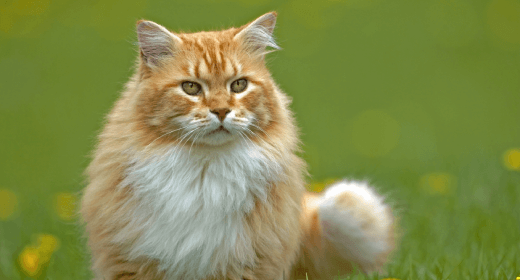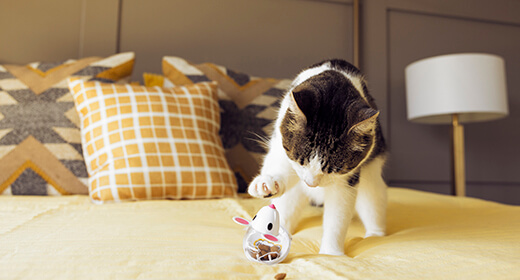

What is the first thing that comes to your mind when you hear the word ‘cat’? It's probably a cat covered in smooth and shiny fur, right? Not only does it look majestic, but every time we pet a cat, it also feels like we are running our fingers through silk. A shiny coat is no less than a divine blessing. However, this heaven-sent beauty can lose its shine if you stop taking care of it. While grooming plays a vital role in maintaining healthy cat fur, there are multiple other factors that influence its look and feel. If you are not aware of how to care for shiny cat fur, continue reading. This article covers everything around cat fur health.
If your cat’s fur looks dull, instead of directly jumping on to quick fixes, try understanding its cause. Here are a few common reasons why cat fur loses its shine:
Now that you know the causes of dull cat coats, you can work towards bringing its shine back. Here are a few ways to make cat fur shiny:
Use the right shampoo: Picking the right shampoo is imperative, especially because the wrong ones can strip off a cat’s natural skin oil and damage the fur.
Avoid excessive bathing: Frequent bathing can lead to dry and flaky skin. Hence, do not make your cat take a dip unnecessarily.
Follow a healthy diet: We all know that hair strands are 90% protein. Hence, providing protein-rich meals becomes vital for maintaining a shiny cat coat.
Skin is the largest organ. And with cats, this organ is generally fully covered with fur. They shed and regrow hair strands multiple times in their entire lifetime. However, a poor diet can slow down the regrowth process. Basically, lack of nutrition can eventually lead to bald spots. A diet that not only includes high-quality protein but also vitamins, minerals, good fats, and other nutrients will fast-track the hair growth process, maintain a shiny coat, and strengthen the immune system.
IAMS™ Proactive Health™ Indoor Weight & Hairball Care cat food is loaded with omega-3 and 6 fatty acids to give your cat a shiny and healthy coat. Other essential nutrients like proteins, vitamins, and minerals in this premium cat food support your feline friend’s overall health.
Cats can lose their coat’s shine due to multiple factors. Here are a few common reasons why your cat’s coat is not shiny:
Maintaining a healthy and shiny cat coat boils down to two things – hygiene and nutrition. As a cat parent, you must ensure that your feline friend doesn’t groom itself too frequently. However, you cannot neglect hygiene either. Based on its lifestyle and vet recommendation, make sure that your cat doesn’t over or under groom. Moreover, follow a nourishing diet that is packed with proteins, vitamins, minerals, and omega-3 fatty acids. Not only will it maintain your cat's shiny fur but it will also boost healthy hair regrowth.
Although applying oil on your cat’s fur might not do any harm, it is best to consult your veterinarian regarding the same.
Cats’ fur can say a lot about their overall health. If your feline friend is nourished and healthy from within, it will be reflected through its skin and coat. So make sure that your cat receives nutrients like proteins, vitamins, minerals, and omega-3 fatty acids in the right quantities to help maintain a cat's coat.


You've just got a new, adorable kitten, and its curiosity and playful nature fill your home with joy. However, one fine day, you notice that your little feline friend is a bit off its game. It seems to be in discomfort and eats barely anything. Moreover, you haven't seen anything in its litter box for a while. Could it be kitten constipation?
Just like in humans, kitten constipation is a condition where your kitten might find it difficult to have a bowel movement. In some cases, this discomfort can be severe and life-threatening, especially if left untreated for more than 48 hours.
While different kittens may present different symptoms, here are some commonly observed kitten constipation symptoms:
Lack of feces production: If your kitten hasn't produced any feces for 24-48 hours, it may be a sign of constipation.
Straining to defecate: Your kitten seems to be struggling in the litter box but produces nothing or very small, hard pieces of feces.
Loss of appetite: Your kitten isn't eating as much as it used to.
Lethargy: The usually playful and curious kitten is spending more time sleeping and seems less interested in activities.
Bloating or vomiting: If your kitten's tummy seems bloated, or it is vomiting, it could be due to constipation.
Kitten constipation can occur due to a variety of factors, such as:
Dehydration: Just like in humans, lack of sufficient water intake can lead to constipation in kittens.
Ingestion of indigestible items: Kittens love to play, but if they end up swallowing items like ribbons or hair ties, it could lead to a blockage in their digestive system.
Lack of defecation stimulation: Unweaned kittens require stimulation to defecate. If this isn't done, they might get constipated.
Intestinal parasites: Heavy parasitic infections in the intestines can also cause constipation.
Neurological or other diseases: Certain neurological conditions or diseases affecting the hindquarters can lead to constipation in kittens.
Now that we've covered what kitten constipation is, let's dive into how we can help our little furry pals.
In a case where your kitten is still active and eating, some home remedies can help alleviate their discomfort. However, if the kitten constipation symptoms persist, or if your kitten becomes less active and stops eating, it's time to seek veterinary assistance.
At the vet, treatments may include fluid injections, enemas, or x-rays to check for blockages. In severe cases, the vet may perform procedures to manually remove the blocked feces or even surgery.
Your kitten's health and comfort are paramount. If you spot the initial signs of constipation, there are some home remedies you can try before visiting the vet:
Keep your kitten hydrated: Hydration is crucial in preventing constipation. Make sure your kitten always has access to fresh water. If your kitten is fond of dry food, consider adding some water to it to increase their fluid intake.
Add fiber to your kitten's diet: A little bit of fiber can work wonders for constipation. Consider adding a spoonful of canned pumpkin (not pumpkin pie mix) to your kitten's food for a kitten constipation remedy. Moreover, you can incorporate IAMS Proactive Health Mother and Kitten food in your pet’s day-to-day meals to ensure sufficient fiber intake. This kitten food also contains FOS natural prebiotic to improve gut health and digestion.
Get your kitten moving: Just like in humans, physical activity can help stimulate bowel movements in kittens. Engage your kitten in fun, physical activities to keep them active.
Continue observing your kitten: Monitor your kitten closely. If the symptoms worsen or persist for more than a day, it's time to call the vet.
Recovery from kitten constipation is generally swift once the obstruction is removed, but it's crucial to address the underlying cause to prevent recurrence. Follow your vet's instructions to the letter, which may include finishing a prescribed medication course and maintaining regular deworming and fecal checks.
Remember, our adorable little kittens rely on us for their well-being. Being proactive in understanding kitten constipation symptoms and causes can help ensure your kitten stays happy, healthy, and ready to explore the exciting world around them.
Don't hesitate to reach out to a vet if you're unsure. With a little love, care, and the right kitten constipation remedy, your kitten will be back to their playful, cuddly self in no time.